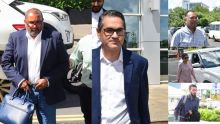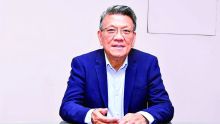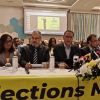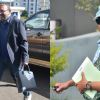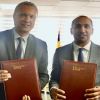
Nowadays, Prediction is very difficult for the future. The world would be very difficult than it is right now and we all know that change is inevitable. I believe that the future of leadership would be definitely the future of humanity be it for a political people, head of enterprises and so on. And effective leadership would guide us about when we strive through opportunities and threats. Research has proven that conventional leaders and leadership of the past are insufficient to meet the demands of today’s world.
Publicité
Our world is characterized by unprecedented complexity, paradox, and unpredictability. Change is rapid and relentless. Delivering a speech or preparing a budget with high enthusiastic jargon do not prove anything in this emerging global village. No politician or head of organization can even make a plan for the next three years or so or even a political of so called leader projecting about the vision of a country , as the leading sheep in the troop is also called a leader despite being may be the coward. Walking in front does not mean to be a leader. Leadership is not about having blind followers.
Today’s leaders face demands unlike any ever before faced. Standard leadership approaches that have served us well throughout much of history are quickly becoming liabilities. Conventional wisdom regarding leadership and many of its habits must be unlearned. The strong, decisive, charismatic, and independent leader and leadership I have idealized, strived to be, depended upon, and longed for may prove counter-productive in the new millennium and undermine a sustainable future. The challenges and opportunities of this fragmented world and country call for a new type of leader and leadership, indeed an entirely new and different way of thinking and acting about leadership and of developing future leaders. A significant gap remains between current leadership competencies and those needed in the future. One important finding is that leadership development programs in industry and higher education have yet to refocus to produce the kind of leaders needed. Head of organisations and politicians pretending to run the country should refigure their mindset and adapt to situations pertaining to the global village. At times people sitting on the big leather seat dictating the subordinates to do so and so. Is it really the person acting to be responsible and responsive to situations, or is it the leather seat who makes him dictate, by arrogance or by virtue of their positions? Offence to none, but it’s a fact. The famous words for politician brings we need change and using the jargon of change. But do they really understand the meaning of CHANGE and where does it emanate from?
To be a global change agent and provide leadership for this shattered world, we must expand our own boundaries of self-understanding and capacity for intervention. Without self-development, One, be it a politician, professional, Chief Executive Officer, head of department, would find it difficult to cross boundaries and operate in complex, uncertain environments, and one’s behavior might exacerbate the fractures that already exist.
Expanding our personal boundaries is about increasing in insight, I push it more, even wisdom. Wisdom is an ancient word that means "the capacity to see." The reality is that as a change agent, we can never see all that is going on because of the complexity of the problem, the complexity of the system, and our blind spots, personal hungers, and natural predilections to use power in a habitual and predictable way. Although we might not be wise enough to succeed at all times, we should have a passion for wisdom to increase the chances of success. How we go about the work of change should be a manifestation of that passion. The passion for wisdom should lead to an intense curiosity to see and understand oneself as an instrument of power-"Why do I react the way I do?" "How do I behave under stress?" "How do I deal with complexity?" "How can I use what power I have more effectively, morally, and responsibly?"
The process of cultivating a wisdom approach, is that think the sages of the past in all the great cultures and religions of the world have given us some powerful guidelines for the pursuit of wisdom be it from the Mahabharata, the Ramayana, the Holy Bible, the Vedas and others. The principles I offer are insights that come from my cross dialogues with leaders and change agents from around the world, many large scale change initiatives in business, education, government, and international development.
Crossing boundaries to exercise leadership requires a high level of capability for mental complexity, even a global mindset. It’s not about thinking outside the box, it is about dealing with complexities outside the box and taking bold decision. At times the hardest decision to take, like taking the sour pills would bring the most unfavourable desired results, but while walking heads up, the respects and wisdom from the outside fractured world would always have the GREAT SAY. In order for any organization or even a government to function well in this global village a global mindset is a must and it is about thinking systemically, increasing in cultural understanding, and seeing complexity and nuance. The opposite of a global mindset is a low-complexity mindset, or a simple, linear way of thinking. The cultural narrative of people with a low-complexity mindset is the source of their truth, and their notion of the truth is unquestionable and not subject to critical examination. They relate to things as Ying or Yang, right or wrong, and good or bad. They lack curiosity and crossing boundaries is threatening and disorienting to them! They value-and will fight to protect-their group boundaries for their vested interest, having in mind the fear of losing and at the same time de-stabilizing the democracy at times or most of the times and abstaining from the right of freedom of expression. They can be tribalizing crusaders and they can be good followers, but they are generally ineffective change agents. In a stable world, low-complexity thinking is sufficient to get by; but in a changing interdependent world it presents difficulties.
The person with a global mindset is more tolerant and open to diversity. One's sense of self is not tied exclusively to a particular cultural narrative but is constantly expanding through interaction with different people and groups in unique and challenging contexts. People with a global mindset embrace contradiction and paradox. They are at ease, even tranquil, with complexity- the WISDOM predominates everything. They do not become flustered in times of anxiety but can be still while seeking to interpret what is happening in a way that allows for useful discoveries to be made. Their discoveries are never truths but interpretations that would be subject to further testing and exploration. They are passionately curious and seek to understand the nature of the essence of things, rather than let the inquiry cease at the level of appearance or symptoms. For them, good questions are always more important than answers because the questions suit them and the answer comes automatically.
With a global mindset, one would find it easier to transcend self-interest, overcome group loyalties, and build diverse relationships when the challenge calls for it because it allows us to see the complex humanity in all groups and layers. We can appreciate that the world which is filled with a rich tapestry of myths, stories, and narratives that enrich the planet and can be harnessed for change. This mindset also enables us to be more multidimensional in leadership style and approach. At times, being reluctant to change, is the fear again of losing, is where certain people get backed up by their leather seats of whatsoever nature of their job.
Although we live in a globalized world, many people lack a global mindset because they communicate only with like-minded people and communities, be it at work, at home, or through social media who are their puppets. They have no real encounter with differences and avoid experiences that might generate a clash in values, beliefs, or style. Face to face communication on a platform hardly happens between leaders, naturally in certain purely democratic countries like USA and others as the fear of being ridiculed by the public or media is high, all escape goats are good and suitable to them.
Even many expatriates can work for years in another country but never really "experience" the culture. They wine and dine with one another but are strangers to the ordinary people in the host country. To develop a global mindset, you must find ways to go beyond the confines of your group boundary. That necessitates pursuing multicultural and diversity-related experiences and, when doing so, putting your convictions to the side and being open to novelty, challenge, and surprise. We need to have our own worldview challenged through direct engagement with difference, even if that engagement leads to conflict. Such experiences can be thought provoking and powerfully enriching, enabling one to better grasp what might be required culturally, politically, and relationally to get important work done.
Change agent leadership also requires a healthy dose of moral wisdom. By "moral wisdom" I mean an ethical compass to guide one in figuring out the appropriateness of the change that you seek and the processes you employ as one go about one’s work. Given the problems generated today by tribalizing authority figures, ugly groups, extremists, corrupt politicians, and irresponsible corporations, there will be times that one must be willing to be a voice against injustice and abuse, even if such a stand puts you at risk. Moral wisdom is needed to determine when to express courage and when to refrain; when a full-frontal attack is needed, and when a paced process of steady adaptation is the best approach.
Expanding one moral capacities requires distinguishing between your personal convictions and moral wisdom. Just because one has a set of convictions does not mean one has moral wisdom, and just because one is willing to take a stand does not mean one is displaying moral courage. Moral wisdom is needed to discern between an inherited "bag of virtues" and what is required to promote the common good. IS An extremist group, for example, can tap their group's beliefs and values to justify widespread violence-not what all people would regard I am not suggesting that as a change agent one should be value neutral.
Change is about the promotion of values, particularly as they pertain to inclusivity, fairness, equity, and justice. I can annotate that a man who starts out on a career of burglary may grow in that direction ... into a highly expert burglar. Hence it is argued that 'growth' is not enough; we must also specify in which direction growth takes place, and the end toward which it tends. Through the process of dialogue, inquiry, and learning through trial and error, groups can make important discoveries. A change agent might also discover that one own sacred values are flawed or need reinterpreting, and it is one that needs to change. Moral courage comes from the heart-it seeks to break down barriers, speaks on behalf of being inclusive, not exclusive, and spotlights hypocrisy.
The human tendency to distance oneself from the responsibility for problems is what I call the protective stance. With the protective stance, people distance themselves from learning and responsibility by attributing blame to others, justifying their own position, and believing the problem is too complex or messy to resolve, so it is better to go about their work and play it safe, do nothing, or bypass the hot issues, which most politicians do. When individuals deploy this protective stance, they collude in anti-learning behavior, and they may actually exacerbate the problem, as witnessed in Rwanda. The learning stance is about being a reflective practitioner and doing the reflective and detective work of examining your behavior and exploring how the system is reacting to your interventions and to what degree progress on the challenge is being made. The learning stance encourages and promotes creativity, experimentation, and learning from failure. Even though a problem seems intractable, overwhelming, and terribly confusing, when approached from the learning stance, one engages the challenge with curiosity. You actually become a force to be reckoned with because you are tough on yourself and ruthless in your questioning to discover what works, what does not, and what is missing. In conclusion, it is important to note that wisdom is not an end state. One do not just become a wise person and the job is done. The process of cultivating wisdom and expanding your personal boundaries is about the journey rather than the destination, and it is a lifelong journey. Without the passion for wisdom, you may be a dangerous instrument of power-dangerous to oneself, dangerous to others, and dangerous to the work of change. What is important is that one has a passion for cultivating wisdom through reflection and for pursuing experiences that can enhance the capacity to see the complexity of the system and to see oneself in it, in order to better navigate the system on behalf of leadership and change.
Real leadership, at times, is painful. It is painful to discover features of one's behavior and natural predilections that are not particularly helpful to the people in their problem-solving and opportunity-enhancing endeavors. Not only is it painful, but it is also a laden. It is a taxed to be responsible for a group and to contend with their dysfunctions and damaging behavior, and to get them to shift their values, habits, practices, and priorities to meet the challenge confronting them. And it is a burden to be responsible for oneself as an instrument of power-to take responsibility for the conspicuous and subtle ways that one's power affects others. In being responsible, one must commit to the necessary personal discovery work to be able to fine-tune one's use of power, in the same way that a mountain climber taking on Mount Kailash must fine-tune his or her body to be able to cope in the thin air as the altitude increases. An unprepared person-physically, mentally, and knowledge-wise-will most likely perish on Mount Kailash, as the hazards are significant. Being a Firewalking expert, at times brings participants to their true self, their self-discovery process in line with nature, why not Mother Nature!
In exercising Real Leadership for adaptive challenges, one is often "walking on the razor's edge." Indeed, given that real leadership is about intervening into people's values and belief systems, it will, at times, be a risky and dangerous work. Therefore, in the face of the demands and dangers of leading, one must take responsibility for oneself as an instrument of power. It can be an asset or a liability. Real leadership is challenging. Anyone who tries to lead will inevitably falter, undoubtedly many times, as one must manage one's personal case (have one eye inward) and manage the adaptive work of the group (have one eye outward).
Fundamentally, the exercise of real leadership begins with an existential declaration that one does care enough to be responsible for the well-being and success of the team, enterprise, or country, even though such work might be burdensome, confusing, and, at times, dangerous. But with wisdom, persistence, and the right tools, one can succeed.
South Africa's first black president, Nelson Mandela, wrote of the spirit of being a real and responsible leader: I have walked that long road to freedom. I have tried not to falter; I have made missteps along the way. But I have discovered the secret that after climbing a great hill, one only finds that there are more hills to climb. I have taken a moment here to rest, to steal a view of the glorious vista that surrounds me, to look back on the distance I have come. But I can rest only for a moment, for with freedom comes responsibilities, and I dare not linger, for my long walk is not yet ended.
I agree with Mandela-with freedom comes responsibilities. Without people taking responsibility for their predicament and providing the necessary leadership interventions, a country is in danger from counterproductive dynamics from within-such as deceit, politics, and self-interest-or powerful forces from without-such as new and more nimble competitors, an unbridled free market, or blatantly hostile groups be they terrorists or extremists. Very often, in Parliaments we find very degrading and vulgar words being used among fellow parliamentarians. Going deep into the figure, that shows the lack of wisdom, the lack of respect to the decorum of the Parliament. So where are we heading too!! The key to progress on our shared adaptive challenges can be found in the recognition that leadership itself must become the perturbing force that prods people to face reality far more deliberately and efficiently than the "natural" forces of politics, environmental change, passive evolution, or even the hidden hand" of the marketplace. While the practice of real leadership, at times, can be onerous, it can also be exhilarating and extremely rewarding.
While it is clear that “time is changing,” for many of us the grip of outmoded and idealized beliefs about leaders and leadership is too strong to allow us to move smoothly and confidently into a present that is already far different than anything the human race has before experienced, a present and unfolding future in which we are all leaders in our own right. Leadership is not about being the leader of an organization or a political party, it is merely the respect to the Party’s constitution in a very democratic way where the so called leader accepts to be threatened by his or her members but still navigates like an eel among the rocks and still reach its objectives or pray. If we survive the challenges of this crumbled world, we have succeeded together; if we fail, we have only ourselves to blame, not some hapless leader in whom we have placed not only our faith and trust, but our responsibility as well. Unfortunately, it is in times of great distress and uncertainty that we turn to leaders. It is then that we are mostly willing to be led by unmeasured speech or promises. We hope their intelligence, guidance, and resolve will see us through the turmoil. While strong, directive leadership and the dependence it engenders may see us through a particular crisis, it is counterproductive. First, it is unsustainable. Dependence is seldom a healthy condition. Second, it is inadequate in dealing with the complexity of this century. No hero-saviour is strong or smart enough to solve problems of global significance. It is only through effective working and leading together that we may have a chance to, yet, save our planet and thrive on it for generations to come.
Now is the just the beginning. You have the Knowledge , you have the tools and you are ready. Now you need to find the path and leave your trail. Leadership is a journey , it’s never ending journey , it involves the process of working from inside to outside . Leaders are catalysts for people and ideas. They are the products and savvy of the environments and dreams. They are the creators of the CHANGE. Emerging professionals it’s the time NOW or NEVER.
The Bible quotes:
There is an appointed time for everything. And there is a time for every event under heaven
Jayshan Keejoo quotes:
There is a season for everything, there is a period for everything, there is time for every period and there is a LEADER for the Real Leadership

Notre service WhatsApp. Vous êtes témoins d`un événement d`actualité ou d`une scène insolite? Envoyez-nous vos photos ou vidéos sur le 5 259 82 00 !













